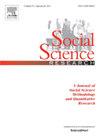调查政治分歧:党派意义制造时代的民意
IF 3.5
2区 社会学
Q1 SOCIOLOGY
引用次数: 0
摘要
大量的学术研究探讨了美国公众舆论沿着政党路线分化的各种方式。这项研究广泛地表明,民主党人和共和党人在许多社会和政治问题上的分歧越来越大,随着时间的推移,在对态度问题的回答中,党派差异越来越大就证明了这一点。本文认为,这项工作可能是基于一个不再站得住脚的假设:即调查项目在对民主党人和共和党人进行调查时,测量的是相同的结构。相反,由于党派认同的性质最近发生了变化,两党成员已经发展出不同的意义制造过程,这样他们可以被提示相同的调查问题,但以不同的方式理解这些问题,从而抑制了他们的回答的可比性。本文通过对1992年至2021年期间进行的调查进行的各种尺度的测量不变性检验来评估这一假设。结果显示,在最近的调查中收集的许多态度问题并没有在民主党人和共和党人之间同等地测量相同的结构。这些发现表明,政党之间社会和政治态度变化差距的估计可能受到党派意义制造的偏见,这对每个群体的调查项目的测量质量产生了不同的影响。更广泛地说,这意味着两党之间的文化分歧越来越大,对世界的共同意义越来越少。本文章由计算机程序翻译,如有差异,请以英文原文为准。
Surveying the political divide: Public opinion in the era of partisan meaning-making
A large body of scholarship explores the various ways in which public opinion has become partitioned along party lines in the United States. This research broadly shows that Democrats and Republicans have grown more likely to disagree about many social and political issues, as evinced by increasing partisan differences in responses to attitude questions on surveys over time. This paper argues that this work may be grounded in an assumption that no longer holds water: that survey items measure the same constructs equivalently when administered to Democrats and Republicans. Rather, due to recent changes in the nature of partisan identity, members of the two parties have developed distinct processes of meaning-making, such that they can be prompted with the same survey questions, yet understand them in dissimilar ways that inhibit the comparability of their responses. This paper evaluates this hypothesis using measurement invariance tests of a wide range of scales administered on surveys conducted between 1992 and 2021. Results show that many attitude questions collected on recent surveys do not measure the same constructs equivalently among Democrats and Republicans. These findings suggest that estimates of the changing gap in social and political attitudes between the parties may be biased by partisan meaning-making, which differentially affects the measurement qualities of survey items in each group. More broadly, they imply a growing cultural divide between the parties, demarcated by a diminishing set of shared meanings about the world.
求助全文
通过发布文献求助,成功后即可免费获取论文全文。
去求助
来源期刊

Social Science Research
SOCIOLOGY-
CiteScore
4.30
自引率
4.00%
发文量
0
审稿时长
65 days
期刊介绍:
Social Science Research publishes papers devoted to quantitative social science research and methodology. The journal features articles that illustrate the use of quantitative methods in the empirical solution of substantive problems, and emphasizes those concerned with issues or methods that cut across traditional disciplinary lines. Special attention is given to methods that have been used by only one particular social science discipline, but that may have application to a broader range of areas.
 求助内容:
求助内容: 应助结果提醒方式:
应助结果提醒方式:


